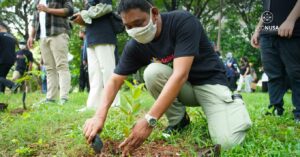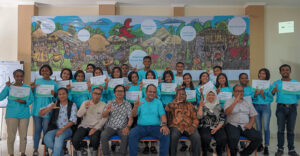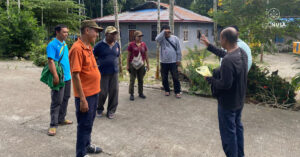
Fishery and maritime governance in Indonesia are deemed in reverse. The setback is marked by the strong backup from the government to bolster investment and overlook the sustainable management of fishery and maritime resources. Worse still, welfare of communities living on coastal lines and small islets have yet to be prioritized as a way of poverty alleviation in Indonesia.
These notions came up on the discussion and declaration of coalition of civil societies for sustainable fishery and maritime (Koral) on 3 March 2020 in Jakarta. Some reputable organizations such as EcoNusa Foundation, Wahana Lingkungan Hidup Indonesia (Walhi), Greenpeace Indonesia, Indonesia Ocean Justice Initiative (IOJI), Destructive Fishing Watch-Indonesia, Indonesia Center for Environmental Law (ICEL), Koalisi Rakyat untuk Keadilan Perikanan (KIARA), Pandu Laut Nusantara, dan Yayasan Terangi attended the event here.
IOJI’s Enforcement Support and Stakeholder Partnership Director Fadila Octaviani said that the Job Creation Draft Bill requires acceleration of investment without any priority of ecosystem protection. The National Commission for Fishery Resource Studies (Komnas Kajiskan) which was formerly stipulated by Law No. 31/2014 on Fishery is skipped over in the Job Creation Draft Bill.
“Based on the Job Creation Draft Bill, authorization is issued by the central government. The elimination of Komnas Kajiskan will lead to the absence of scientific evidence-based fishery management and neglect the fishery resource stocks,” said Fadila.
EcoNusa Foundation’s Ocean Program Manager Wiro Wirandi said that with negligence of fish stock condition, investment will only end up with the worsening pressures to fishery resources and ocean ecosystem health. Wiro also underlined the opening plan for lobster seed export that was formerly banned by the Ministerial Regulation No. 56/2016. On the other side, utilization of lobsters should be cut down due to overfishing in all regions of fishery management in the Republic of Indonesia (WPP-NRI) as mandated by the Maritime Affairs and Fisheries Ministerial Decree No. 50/2017 on the Estimate of Potential, Eligible Amount of Fishing, and Utilization Rate of Fishery Resources in the regions of fishery management.
“The government should have shifted the red status (overfishing) to yellow one. Then, there should be a policy to drive down to green status which will be followed by policy for eligible investment increase in the maritime and fishery,” added Wiro.
Meanwhile, KIARA Secretary General Susan Herawati said the government’s backwards move in fisheries and maritime management has happened through the use of cantrang as a fishing instrument. Formerly, cantrang is banned under the Maritime Affairs and Fisheries Ministerial Decree No. 71/2016 on the Fishing Track and Placement of Fishing Instrument in the Regions of Fisheries Management of the Republic of Indonesia.
“Ministerial Decree No. 71 shall not need revising but endorsing and implementing as its mandate. This is deemed a backward move from the KKP (Maritime Affairs and Fisheries Ministry) and the state in particular,” said Susan.
On the occasion, Susan regreened that foreign boat is possible to enter the Indonesian’ fishery management region. The fourth cluster of the Job Creation Draft Bill deals with the simplification of business licensing and investment requirement as stipulated by Article 27 as saying “Everyone possesses and/or operates fishing boat with foreign flag that is operated for fishing in the ZEEI shall meet the business licensing issued by the central government.”
“Despite its trespass to the exclusive economic zone, it tarnishes our sovereignty. The foreign ship crew should be at least of Indonesian citizenship, but who could control it? This is about the nation sovereignty,” said Susan.
Walhi’s National Campaign Coordinator, Edo Rachman, asserted that the government should have focused on human resources development of the communities living in coastal lines and islets in a bid to cut down poverty rate. There are about 140 million coastal populations with 2 percent growth per year and they deserve the government’s full attention.
“Around 25.14 million populations living under poverty line are mostly living in coastal and islets areas. The government should have focused on developing human resources and securing their fishing areas. Most of regions in Indonesia is sea and I think it is possible that maritime and fisheries sector will be completely exploited,” Edo stressed out.
Editor: Leo Wahyudi




